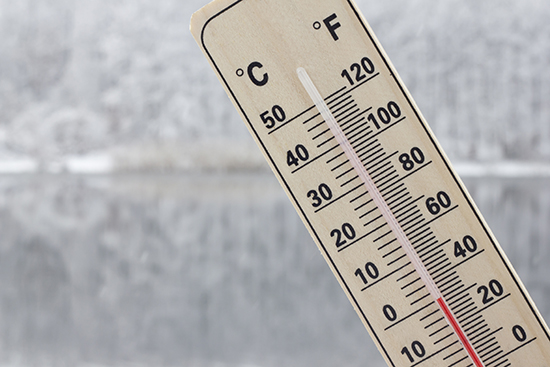Arctic Chill Expected This Weekend
Protecting yourself during a dangerous cold snap

The coldest weather of the winter so far is coming our way this weekend, so read our safety tips and bundle up when venturing out.
The good news: we almost made it halfway through February with just a couple of minor snowfalls. The bad news: the most dangerous cold snap of the winter is approaching and will arrive, inappropriately, on Valentine’s Day weekend. Temperatures are expected to drop below zero Saturday night (with a daytime high of 18) and Sunday night (a daytime high of 10). The National Weather Service warns that the wind chill factor may make the temperature feel as cold as 20 below zero on Sunday. There is a slight chance of snow showers Friday night and Saturday morning.
BU staff and students, especially students unaccustomed to a cold climate, should review the cold weather precautions listed on the city of Boston safety web page. Most important is dressing for the severe cold: wear several layers of loose-fitting, lightweight, warm clothing rather than one layer of heavy clothing. Be sure that your outer layer is tightly woven and windproof. Cover all exposed skin and watch for frostbite (freezing of the skin and underlying tissues). In extreme cold, frostbite can happen in less than a minute, and wind makes the risk that much greater.
The symptoms of frostbite include loss of feeling and white or pale appearance in extremities such as fingers, toes, earlobes, and the tip of the nose. Anyone with these symptoms should contact Student Health Services at 617-353-3575. Signs of hypothermia (a dangerously low body temperature) include uncontrollable shivering, memory loss, disorientation, incoherence, slurred speech, drowsiness, and apparent exhaustion. If you or someone you know shows any of these symptoms, call 911 immediately.
Severe cold can take a toll on buildings as well as people, says Thomas Daley, a BU associate vice president at Facilities Management & Planning (FMP). “Our buildings all have heating/cooling, fire sprinkler, and lab cooling systems that can easily freeze up when subjected to subfreezing temperatures,” he says. “We have had doors that do not close all the way because of snow and ice, windows in offices that are left open, and dorm room windows that are opened to let in a breath of fresh air and never closed.” Close the windows and keep them closed, he says.
“When you add high winds to the mix, disaster can result,” Daley says. Wind can drive cold air several feet into a space, quickly freezing waterlines, which can rupture and result in flooding. This can be prevented by making sure that all of your spaces are completely buttoned up when you leave the room or building, he says, adding that “if you see open windows and doors during extreme temperatures, report them to the FMP emergency line at 617-353-2105. Close up your coats, windows, and doors and keep yourselves and your spaces warm.”
If you live in an apartment-style residence and your apartment is chilly, do not under any circumstances try to stay warm by turning the oven on and opening the oven door. Space heaters are prohibited for fire safety reasons.
As uncomfortable as this weekend’s arctic plunge is expected to be, take heart. The National Weather Service is predicting a high temperature of 47 on Tuesday.
Other tips for cold weather safety:
- Be aware of extreme weather conditions by continuously monitoring media reports.
- In addition to dressing in layers with a tightly woven and water-repellent outer garment, protect your extremities by wearing a hat (most body heat is lost through the top of the head), mittens (better than gloves), and sturdy waterproof boots. Cover your mouth with a scarf to protect your lungs.
- Make sure you always have a well-stocked winter home emergency kit that includes flashlights, a portable radio, extra batteries, a first aid kit, bottled water, nonperishable food, and a manual can opener. Do not use candles.
When using alternate heating sources, such as a fireplace, wood stove, or space heater, take the necessary safety precautions. Keep a fire extinguisher handy and make sure that everyone knows how to use it properly. Test smoke alarms and carbon monoxide (CO) detectors to make sure they are in working order.
- If you lose your heat, seal off unused rooms by stuffing towels in the cracks under the doors. At night, cover windows with extra blankets or sheets.
- Be a good neighbor. Check with elderly relatives and friends who may need assistance to make sure they’re safe.
- To keep pipes from freezing, wrap them in insulation or layers of newspapers, covering the newspapers with plastic to keep out moisture. Allow a trickle of warm water to run from a faucet that is far from your water meter or one that has frozen in the past. This will keep the water moving so that it cannot freeze. Be sure you know how to shut off your water supply should a pipe burst.
- Drink noncaffeinated fluids. Dehydration occurs more quickly in cold, dry weather. Be sure to keep yourself well hydrated, especially if you are exerting yourself.
- Don’t drink alcohol. Alcohol can speed the onset and worsen the effects of hypothermia.
- Make sure your car is properly winterized. Keep the gas tank at least half full. Store in your car emergency blankets, extra clothing, a flashlight with spare batteries, nonperishable foods, a windshield scraper, a shovel, sand, a towrope, and jumper cables.
- Make sure you have sufficient heating fuel.
Find additional information about winter preparedness here.
Comments & Discussion
Boston University moderates comments to facilitate an informed, substantive, civil conversation. Abusive, profane, self-promotional, misleading, incoherent or off-topic comments will be rejected. Moderators are staffed during regular business hours (EST) and can only accept comments written in English. Statistics or facts must include a citation or a link to the citation.